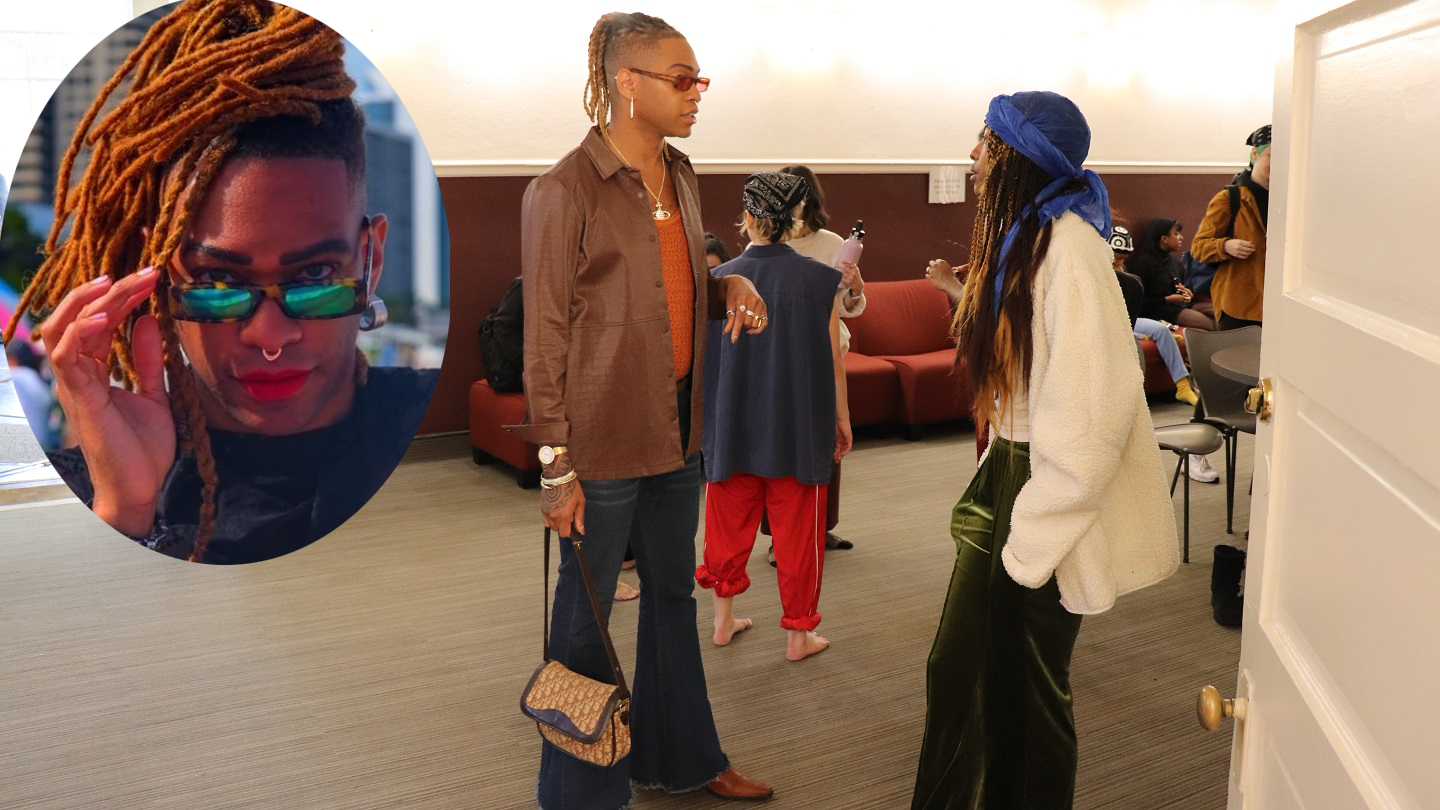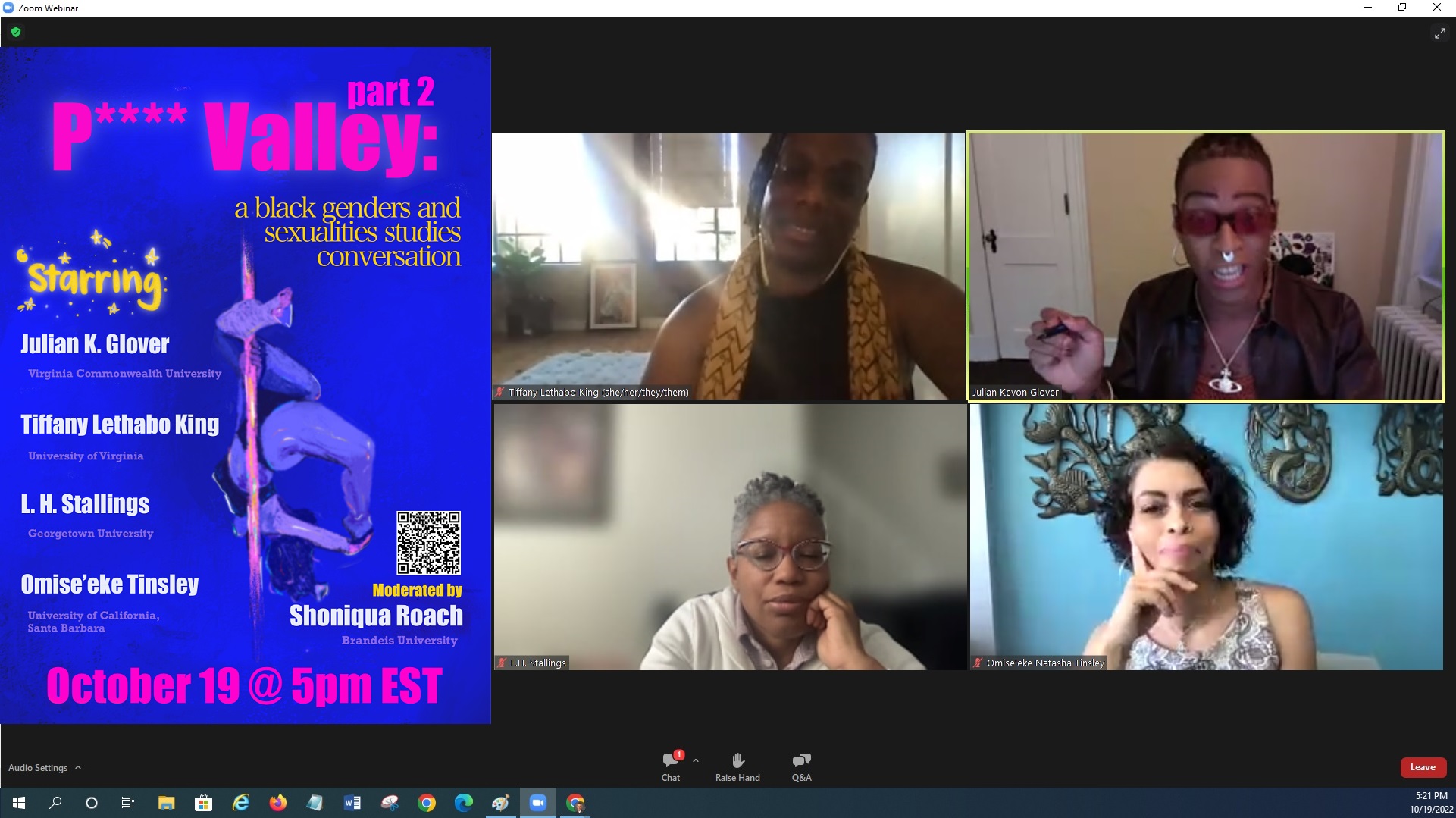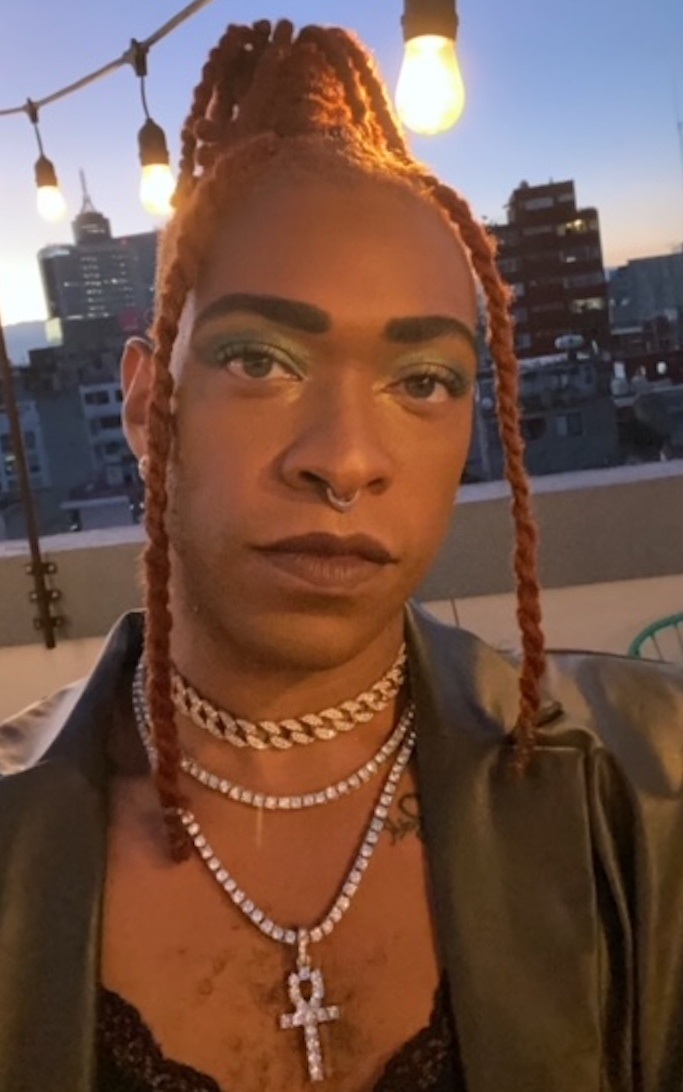Glover’s work on self-determination is not just theoretical but deeply personal

The activist, performer and iCubed scholar studies and celebrates the embodied knowledge of marginalized communities
“I really am a shapeshifter,” asserts Julian Kevon Glover, Ph.D. “You never know what I’m going to look like.”

She continues, “Today I was listening to Shania Twain’s ‘Man I Feel Like a Woman’ so here I am dressed in my boots and my bellbottoms. Tomorrow, I may feel like a vampire so I may come in all dressed in black.”
For the assistant professor with a unique appointment that spans both VCU’s School of the Arts and the College of Humanities & Sciences, wardrobe choices resonate beyond day-to-day whims. “My appearance and what I wear reflect a process of ongoing internal transformation,” Glover says. “For me, it means I’m honoring the multiplicity of selves that I have within myself.”
Glover brings her process of deep introspection to all aspects of their work, spanning from cutting-edge research to challenging creative expression. Recognized as an expert on ballroom culture, she is regularly asked to sit on or moderate academic panels exploring issues related to Black queer and trans culture.
The scholar is also preparing her first book that will describe “freedom practices among black folks, that allow us to render our lives with meaning.” “I’m focusing on topics like transmutation and multiplicity: exploring what it means to accept a multivalent self, rather than reduce ourselves to the cage of identity,” she says.
Embodied Knowledge
The concept of embodied knowledge factors significantly in her work. “Embodied knowledge reflects the harnessing of forms of subjugation across race, gender, and class,” explains Glover. “The insight that is derived from those experiences of subjugation is transformed into strategies, tactics and tools by which [members of marginalized communities] acquire the human and material resources needed to survive and thrive in a world that remains hellbent on our annihilation.”
Glover says embodied knowledge doesn’t just involve survival tactics, but describes how people imbue their lives with meaning. “That’s the most important part of the theory,” she says. “The world tells us in so many ways that our lives aren’t worth anything. We have to do so much work to NOT believe it. Embodied knowledge is about self-determination, creating and remaking one’s self, to be in effective communion with one’s community.”

Research into the ballroom scene helped her define and flesh out ideas around embodied knowledge. Doing so required a truly community-engaged approach. “You’ll notice I don’t say ‘research participants,’” she explains. “I have ‘interlocutors.’ I see the research process as an ongoing dialogue, where I’m learning from them. They may be learning from me as well, but we are very much in dialogue. We developed these theories together.”
Changing the landscape
“Julian really does that hard and messy work: being in the community, working with the community, grappling with and coming against points of tension,” says Archana Pathak, Ph.D., a colleague of Glover’s as a professor in the Department of Gender, Sexuality and Women’s Studies. “She is theorizing at astute and profound levels in a way that is shaped by, informs and advocates for that organic base.”
“She is changing the landscape of different disciplines while working from a grassroots place,” Pathak continues. “To me, that is what higher ed is supposed to be about.”
Glover came to VCU in 2019 from Northwestern University and was somewhat surprised to find such a robust community. “Coming from a place like Chicago, I thought I might have some trouble,” she says. “But Richmond is a real hidden gem.”
Dr. Glover’s breath-takingly brilliant work is committed to Black queer world-making, surviving, thriving, and creating against the backdrop of a world committed to Black queer death.
Jennifer Nash, Ph.D., Duke University
“On the whole, Richmond is much more queer than people might think given its history,” she says. “There are a lot of people here whose work makes a lot of sense in combination with mine.” As a self-described “foodie,” they appreciate the culinary scene and also that Richmond is a very arts-focused community.
It’s not about recognition
Glover is a classically trained cellist and, in the past, has worked with the Grammy award-winning Swedish singer Robyn. Shortly after arriving in Richmond, Glover was able to express her creative side through a performance of her choreopoem “Embodied: Or What It Means to Get Your Life When Society Wants to Kill You” at the 2020 Dance NOW series at the ICA.
While she is energized by her creative work, when you add in her course load as a professor and her service work, Glover’s weeks are packed. “I’m blessed to have the opportunity to do the variety of things I do here,” they say. “There’s no such thing as a typical week, besides every one being very busy.”

The impact of her work has garnered fans across the country. A mentor of Glover’s, Jennifer Nash, Ph.D., a professor of Gender, Sexuality, and Feminist Studies at Duke University, enthuses, “Dr. Glover’s breath-takingly brilliant work is committed to Black queer world-making, surviving, thriving, and creating against the backdrop of a world committed to Black queer death.” Reinforcing Glover’s theories of embodied knowledge, Nash says, “Julian’s work insists that the body is a site of knowledge and history, that the body knows, senses, and feels. Theorizing could be more faithful to the complexity of human experience if it could honor embodied knowledge.”
Glover demurs when faced with praise and recognition: “I do this work because it has deep meaning for me; it feels very much aligned with my purpose in life. I’m not doing it to be recognized for it.”
“I’m energized by seeing someone’s critical thinking skills grow, or seeing their thinking change or develop,” says Glover. “I see people pick up new skills that they are then able to enact in their own lives and influence people in their communities. That feels really good.”
Editor’s Note: Diversity Drives Excellence Profiles introduce you to some of the diverse faculty and staff members whose work makes VCU such an uncommon and amazing university. The Office of Institutional Equity, Effectiveness and Success (IES) publishes the profiles on its blog and promotes them across its social media channels. Please send questions or comments about this series to [email protected].
Categories Diversity, iCubed